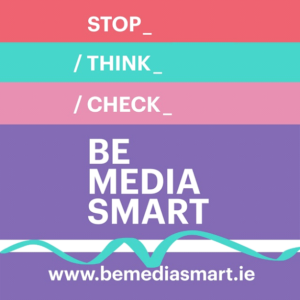Since early October, Media Literacy Ireland and EDMO Ireland have joined forces to deliver a series of webinars and training sessions to promote media literacy concepts and practices across the country, especially in relation to best practices to analyse and evaluate the information we come across daily.
As part of this initiative, EDMO Ireland developed the Be Media Smart Workshop in a Box consisting of teaching guidelines, slides, and learning resources to empower teachers, librarians and community leaders with the necessary knowledge, tools, techniques, and resources they need to deliver a media literacy workshop in their communities.
The Be Media Smart Workshop in a Box is freely available for download on the MLI website in both English and Irish, and it can be adapted to cater for different target audiences with a copyright free license.
Over the course of 8 weeks, nine 3-hour long training sessions were delivered, amounting to 118 attendees in total. The sessions aimed to explain how the teaching resources should be used, showing the different materials, guiding participants through the slides, and engaging them in conversations about different media literacy topics.
Participants were asked to complete a survey after the session to help us improve the resources and the training sessions, and around 50% of them did so. We were happy to learn that for 98.3% of respondents, the training met their expectations ‘very much so’ or ‘to a large extent’, and that 83.6% found the resources ‘very relevant and useful’. One of the participants was complimentary about the fact that “there was plenty of information and resources made available”, and another one claimed that after the session they “have a better understanding of the key factors to highlight when discussing media content.”. The vast majority of attendees who completed the survey also agreed that after the training two things have improved: their knowledge of media literacy concepts and the disinformation problem (88.5%), and their skills as a media literacy trainer (86.8%). Two thirds of respondents also claimed that they feel confident enough to organise and deliver the media literacy workshop within their communities.
The Workshop in a Box is under continuing evaluation and analysis and we were grateful for valuable insights that will help us assess its effectiveness and make the necessary improvements.
Besides the training sessions, MLI and EDMO Ireland have also held four webinars on different media literacy topics, such as digital media spaces, how to tackle disinformation, and the work of fact-checkers. One webinar was delivered specifically to secondary teachers who are currently teaching or have an interest in teaching the Digital Media Literacy short course. According to a recent report organized by a European project called TeaMLit, key stakeholders in Ireland agree that there are serious gaps in the provision of both training and resources for teachers who want to teach topics related to media literacy in schools. Following this finding, this webinar sought to discuss the 4 strands of the curriculum specification for the DML short course, showing opportunities in terms of topics that can be addressed, and also providing some practical tips and resources for teachers. Participants also completed a short survey after the session, and we were happy to learn that four-fifth of the respondents found the webinar ‘very relevant and useful’. Most teachers also agreed that the content of the webinar will help them deliver the DML short course in their schools (93.7%), and that they feel more confident about delivering the short course as a result of the webinar (81.2%).
The survey also highlighted the need for sustainability measures and continuation of training. All the respondents claimed that they would like to learn more about media literacy, and one of them emphasized that the content of the webinar was the only information they have ever got about digital media literacy. Some suggestions included “follow up training”, “more specific resources”, sessions focused on each strand and “how to teach it”, and having “DML included on JCT training days”. It is clear that these sessions are helpful as an overview of the topic and the resources available, but more training is definitely needed.
The training will end on the 6 December with a session on media literacy, critical thinking and countering disinformation organized by the Local Government Authority Agency (LGMA) specifically for librarians. Overall, I think we can say with confidence that the feedback from all the sessions have been excellent, but it is also important to acknowledge that this is just the start of a long process of providing people in Ireland with the knowledge and skills they need to become media literate and have a healthy relationship with the information they consume daily.
